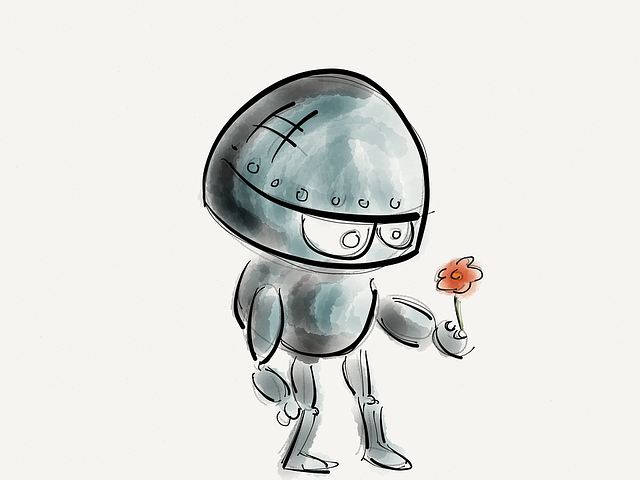Our species has made huge material progress in recent times. Yet, the human experience in modernity is increasingly one of tension, unease and psychological fragility. We march forth with the determination of a robot army, but at what cost? Are we creating a machine world that is threatening the very essence of our humanity?
Everywhere
With origins in the Enlightenment and the Industrial Age, the force of our current paradigm has gradually been growing. And, its force is present in how we organise every aspect of our lives, be it education, employment or entertainment. How we think and make sense of the world. How we approach leisure and love. Even how we view life and death.
The mechanistic visions of the Industrial Revolution and the Enlightenment set the stage for a machine world by harnessing a particular feature of our great gift that is the human mind – the power of analytical thought. The ability to measure and calculate, analyse and reason. It is the power of analytical thought that has allowed us to control and manipulate the physical world like never before.
A machine world created
Increasingly, humankind began to approach problems by breaking them down and investigating their parts, searching for greater levels of detail. Separating and deconstructing. This approach was reflected across the board. Whether in the movement from the study of larger masses to the quantum level in Physics, from the level of the organism to the genome in Biology, or in the hyper-specialisation of trade and employment in the economy.
Spurred by the hunger for knowledge and economic development, this way of thinking was proving extremely useful. Humankind made phenomenal scientific and material advancements in a relatively short period of time. We developed automobiles, life-saving vaccines and super computers. And, with these successes came an increasing feeling of being in control, and along with it a desire for even more of it! A desire for more and more analytical certainty over everything, such that one might ask if it has become an addiction?
Dark side of control
The excessive desire for analytical control and certainty has a darker side. We might want so much of it that we accidentally elevate spurious indicators of value above the actual things of value themselves. That we elevate diplomas above real passion and skill (corporate job market), grades above true learning (mainstream education), political correctness above genuine discussion (public discourse), status achievements above personal fulfilment (mainstream ‘success’), improvements in material living standards above human wellbeing (economic/technological progress obsession), and sterile over-intellectualisation above direct feeling and expression (creative arts).
The approach that produced the wonders of modern science and technology is in real danger of creating a machine world. A machine world that devalues an essential part of our humanness – our ability to perceive what cannot be analytically measured. What cannot be precisely pinned down, but is deeply felt. What is more than just the sum of its parts. For example, we cannot measure and analytically ‘prove’ that we love somebody, or how a piece of music moves us. Yet these things are very real and felt by everyone. Devaluing this part of our nature risks stifling the very spontaneity of expression that makes us who we are – human.
Remembering our gifts
Perceiving the more elusive and less-easily-pinned- down is as much a gift of the human mind as analytical thought is. Both are essential for life. It is the dominance of the latter that we must become alert to. Otherwise, we risk always looking to the outside for measurable certainty and control, rather than inside to the direct human experience.
We risk running after externally-measured ideas of ‘success’ and fulfilment, rather than seeking these within. We risk becoming machines that hit measurable targets and tick boxes, but remain hollow. Because we have forgotten how to express ourselves from the inside out. How to experience life as an unfolding, rather than as a series of hoops to jump through.
Can’t tell the difference
A real danger with our machine world is the frog in boiling water effect. This is where gradual changes are not perceived and hence become quickly normalised. The water temperature rises slowly until the frog is boiled to death without it ever noticing!
Similarly, we might find ourselves so immersed in a machine world that we do not realise how it is gradually changing us as a species. Day-by-day, year-by-year, decade-by-decade.
Man or machine?
One of the features of machines, even super-sophisticated artificial intelligence (AI), is that they really only replicate things. They copy and re-produce, often quicker and with more technical precision, certain things that humans do and some things we cannot do. But, copying and doing is not the same as being. AI re-producing subtle human behaviours to copy love is not the same as deeply feeling love. AI ‘pretending’ to console you when you are in pain is not the same as actually caring that you are in pain.
This is the difference between intelligent AI and human-like conscious AI. And we have not created the latter yet. Because we have no idea how consciousness, or mind, as a subjective flow of experiences works from a biological perspective. But, what if we might accidentally be lowering the bar?
Noticing the machine world
When people speculate on dystopian possibilities for the world, we hear all kinds of ideas. Be it Hollywood’s Terminator-style killer robots or the emergence of a “useless class” of people made redundant by AI. What concerns me more however is something that is already strong and growing within our world. What if our ever-increasing desire for certainty and our obsession with rigid control is causing us to lose a crucial part of what makes us human? Causing us to get locked in a machine-like existence that has lost touch with the spontaneous human expression.
Turing test
That’s when the Turing test is no longer valid. The Turing test was developed by the British mathematician and computer scientist, Alan Turing, in 1950, to test a machine’s ability to show behaviour that is indistinguishable from a human. Turing, who laid the foundations for modern computer science, proposed that if a person could be fooled by a machine to believe that it (the machine) was human, the Turing test would have been passed.
Lowering the bar in a machine world?
But, here’s the catch. If we are allowing ourselves to become more like machines, are we not lowering the bar for the Turing test? If we are losing the very essence of our humanness, how can we hope to create conscious AI in our own image? The Turing test might be passed, not because we have managed to create machines that are human-like, but because we have ourselves become more like machines, such that we don’t know the difference anymore!
Unchecked, our machine world may now be marching towards such a scenario. A scenario where we are unable to distinguish man from machine, because we have forgotten what makes us human.
Read more about the machine world and the nature of self in Harsha’s new book Machine Ego – Tragedy of the Modern Mind.
_____________________________________________________________________________________________



Recent Comments